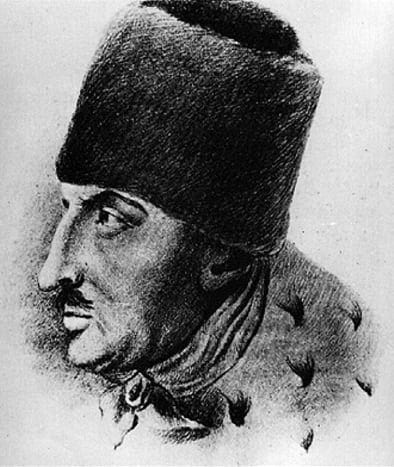Burning of 10,000 Talmuds
"A charismatic man, a psychopath, a charmer, a fraud."
Frankists win disputation with Talmudists in 1757.
Jacob Frank (b. Jakub Lejbowicz 1726 –1791) was an 18th-century Polish-Jewish religious leader who claimed to be the reincarnation of the self-proclaimed messiah Sabbatai Zevi (1626-1676) and also of the biblical patriarch, Jacob. His followers were called “Frankists.”1
In 1756-57 the Frankists presented themselves as contra-Talmudists, an autonomous group opposed to the power of the rabbis, yet a sect within Judaism.2 The Catholic Bishop of Kamenetz-Podolsk took seriously the "Anti-Talmudists," or "Zoharists," as the sectarians began to style themselves, and in 1757 arranged a religious discussion between them and Jewish rabbis. The bishop decided that the Talmudists had been vanquished, and ordered them to pay a fine to their opponents, and to burn all copies of the Talmud in the bishopric of Podolia.3
Olga Tokarczuk (Nobel Prize in Literature 2018) speaks in an interview about delving into the mystical world of hypnotic and mesmerizing characters for her novel about the false messiah Jacob Frank in her novel, The Books of Jacob. 4

The events in The Books of Jacob came at a crossroads in time when Kabbalah, Sabbatianism, and Hasidism intersected. These movements had messianic components and a deep-seated feeling of revolutionary, spiritual exhilaration. …Nihilist Frankism cast-off rabbinical halakha and the yolk of commandments and prohibitions. The new world order that Frank proposed was founded on blasphemy, sexual liberty, idolatry and devotion to the cross. And were considered acts of redemption: "Divinity and sin are inextricably linked." 5
“Jacob Frank and the Burning of the Talmud.”—Dr. Henry Abramson. YouTube.
Maciejko, Pawel. The Mixed Multitude: Jacob Frank and the Frankist Movement, 1755-1816. Philadelphia: University of Pennsylvania Press, 2011.
“Jacob Frank.” Jewish Virtual Library.
Olga Tokarczuk interviewed by Rona Tausinger. 'I wrote about a charismatic man, a psychopath, a charmer. A fraud.' Israel Hayom, April 14, 2020.
Ibid.



I believe you made a common error with the word yolk. As I understand it, in Abrahamic religions the term is yoke, and means a burden placed on the shoulders of a member, just as a yoke is placed on the shoulders of laboring animals.